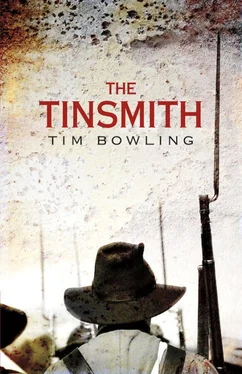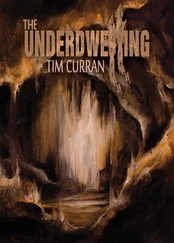He was right, of course. It was a handsome white charger, its front legs gracefully tucked under its blood-soaked body, its noble head turned to the side. The poor creature looked to be living still, unlike the hundreds of others scattered around, most of them tangled in their reins so tight that they might have been tangled in their own bloody guts. But Gardner hadn’t time for dead horses now, no matter what they looked like.
“They willna move the man’s horse,” he said. “It’s him they’ll soon be after. And they can have him too, just after I get my study.”
Gardner quickly looked around. It was still dark enough for cover and he wouldn’t need more than ten minutes. Keeping his hold on the legs, he dragged the body toward the dead rebels, deliberately avoiding its ghastly expression. If not for the heavy smell of blood, he thought the corpse might open its mouth and shout at any second.
No one saw him as he moved slowly toward his goal. He knew then, with Lee reportedly in retreat and the sun rising, that fortune was truly on his side. It would be a bonny day, the exposures would be wonderful. Even here, in a position behind the front lines, and in the grey dimness, he could see what a terrible carnage had occurred. It did not leave him unmoved. But sentiment, for a soldier or a photographer, was a luxury to be enjoyed when the work was done. And his was only starting. Fast work it would have to be too. With the Rebels gone, the army would waste little time in clearing its dead from the field. Already Gardner was gagging on the stench. It hung so putrid and solid that he knew no burial party would linger over their duty.
When he reached the sprawl of dead rebels, he paused for a while to consider them. Already some were bloated, their hands and feet twice their usual size, their faces black as any negro—one wore a fountain of bloodstains from throat to forehead, another, likely caught in the act of preparing to reload, had the end of a cartridge clamped between his teeth.
The light came on steadily. Gardner hesitated, one hand on the rough bottom of his long beard. He thought it an odd matter that this same sun, responsible for blotting out all traces of individuality from a man, for staining and corrupting his face, should also be the agent for preserving his last earthly appearance forever. He placed the body carefully between two rebels, building a sort of breastwork of their corpses to hide the civilian from sight. Then he turned to the east and squinted at the wagon’s ponderous approach. A low, broken mist like a ghostly fence wreathed the torn earth. Except for the groans of the wounded, all was still. Then Gardner realized why his assistant moved the wagon so slowly. Even from many rods away, he could hear the faint clinking of the glass bottles of chemicals inside the wagon—it was a shivery, graveyard sort of sound, and for a moment it unnerved him, even more than the piteous complaints of the wounded.
The moment passed. Gardner deemed it advisable not to remain near these particular dead. In an hour, he and Gibson could begin in earnest. But he knew there were portions of the field that contained more dramatic photographic possibilities. It was, after all, extensive, covering over a square mile from the woods and fields in the north to the fight at the creek bridge in the south. The day before, watching from the hillsides, he had seen that the fighting had been fiercest along the pike, in the vicinity of the little whitewashed church. And early reports had mentioned a great slaughter in a cornfield as well as along a sunken road. Later, should time permit, he would return here to make a study of the mutilated slave owner. Ha! If this day did not mark his break from that popinjay Brady, it would be no fault of Providence! Here was glory worthy of any man’s craft. And yet, when he considered the violations performed on this body, when he regarded the bloody pulp at the groin, all thoughts of glory seemed meaningless. But he who lives by the cruel hand dies the same.
The shadow of Gardner’s horse fell on the dead man’s face, turning it as black as his Rebel comrades’.
Jim whispered down. “If you’re quite finished rearranging bodies, Alex, I could use a last cup of coffee before we start.”
Gardner nodded. By the time Jim had had his coffee, perhaps back at the hospital where the cooks would doubtless have pots on permanent boil, they’d know for certain that the Rebels had retreated. Then it would be time enough, and light enough, for glory.
After walking a hundred yards south, the two photographers came upon a grim scene. Gardner was thankful for the slow approach of the light, else he might have been duty-bound to record the misery of that foul barnyard. The wounded and the sleeping lay mixed in among the dead, so closely that the bodies formed one large body that groaned, wept, snored, vomited, cried out in agony—no foot of earth was uncovered but for the area around the surgeons’ tables. Large canvas tents greasy with shadows stood in the field outside the barnyard fence. Several wagons were being emptied of supplies—blankets mostly, but also bandages, bottles of pills, and liquids. Apart from the surgeons, the few men who were moving at all were moving slowly, as if fighting through molasses.
As Gibson hitched their horse to a rail and headed toward a leaden-faced negro cook stirring a pot, Gardner stepped up to one of the operating tables. A ragged, pointy-jawed soldier lay there, his eyes like raisins pushed into lard. His thin lips either trembled or muttered a prayer, Gardner couldn’t tell. A sort of cone was placed over the soldier’s nose and mouth and some liquid dripped into it. Then the surgeon, a bearded man of middle years with a strong nose and prominent brow, both already besmirched with blood, took a double-edged knife from between his teeth and bent closer to his patient. Soon the surgeon’s head and that of his assistant, a very tall, long-limbed soldier in a ripped uniform, hovered so close over the anaesthetized figure that Gardner could not be sure who held the knife. Even when the sawing of the thigh began, it seemed that both men moved the implement. Gardner didn’t hear them speak at all. But when the sawing was done—a dull, disturbing sound that made Gardner grit his teeth—the surgeon and not the assistant turned with the leg in his hand and looked straight at the photographer.
Ah, had he been beneath the cloth at that moment, with enough sun to let it stream through both lenses, Gardner knew he’d have captured a face that revealed the very meaning of warfare. True, it was an ordinary enough face in respect to the features—the nose and brow, though fine, were not exceptional, and sunken cheeks and bloodshot eyes were sadly familiar in most men of the time. But the feeling behind the eyes, the sense of a barely controlled agony, made all the more remarkable because the eyes did not seem to take anything in! Oh, what a stereo he’d have made from that face. Though the surgeon looked right at him for several seconds, Gardner was convinced the man was not seeing him. He drifted like a sleepwalker to a tall pyramid of bloodied, fly-greasy limbs and rested the leg on top as if careful to maintain the balance of the whole. When he drifted back, he limped slightly, perhaps out of sympathy for the soldier whose leg he’d just removed. Gardner decided, then and there, that he’d find this surgeon again, either this day or the next, and get him to pose. But the dead had to come first.
This thought brought the stench in even more powerfully. Over by the tents, a sound of retching, deeply drawn out, almost made Gardner ill himself. He pulled his flask from his hip pocket and took a long slug of whisky to cleanse his palate.
He heard the drummers begin to call the troops to the day. Their rippling rhythm straightened the gravediggers up and stirred the able-bodied soldiers, who rose like spirits among the dead and wounded. Despite the preparations, Gardner heard rumours from hopeful soldiers that Lee had indeed retreated in the night. He found Gibson and said, “Let’s start here. We’ll just go back, take a few studies of dead soldiers and that unfortunate property owner, then go up to the front with the burial parties. I’m sure we can ask them to stop their work long enough to get our exposures.”
Читать дальше












